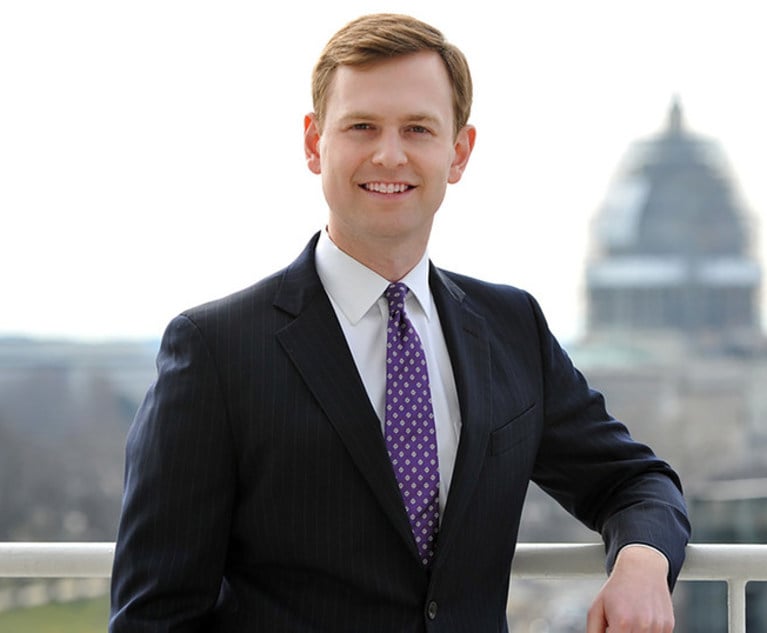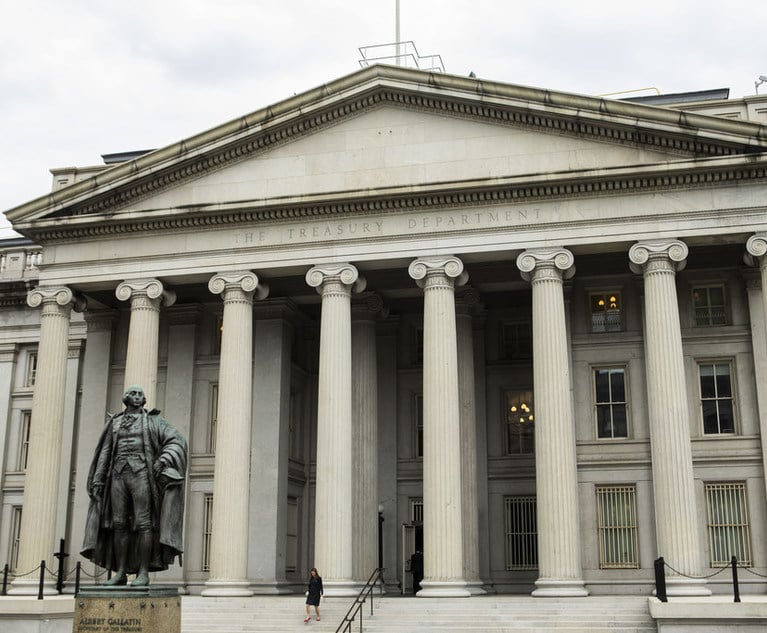Petition to Look at Former CBS Lawyer Underscores Ethical Risks of Social Media
After being fired for a controversial Facebook post in the aftermath of the mass shooting in Las Vegas, former CBS lawyer Hayley Geftman-Gold…
October 06, 2017 at 07:33 PM
5 minute read
The original version of this story was published on Law.com
After being fired for a controversial Facebook post in the aftermath of the mass shooting in Las Vegas, former CBS lawyer Hayley Geftman-Gold is the subject of a petition calling for the New York State Bar Association to consider whether she is capable of remaining professional in response to a tragedy.
This push, which calls for the NYSBA to consider whether Geftman-Gold's social media post is in keeping with her professional obligations, highlights the ethical risks lawyers face when it comes to using social media, attorneys say.
Not long after a gunman in Las Vegas killed more than 50 people and injured nearly 500, Geftman-Gold, who was a vice president and senior counsel of strategic transactions at CBS, posted in a Facebook discussion that she was “not even sympathetic” because “country music fans often are Republican gun toters.”
CBS fired her Monday, saying in a statement Friday to Corporate Counsel that the views expressed by Geftman-Gold on social media were “deeply unacceptable to all of us at CBS.” Geftman-Gold, who could not be reached for comment, said in a statement provided to Fox News that she sincerely regrets making the “indefensible post.”
The petition, addressed to NYSBA executive director Pamela McDevitt, condemns Geftman-Gold's “reprehensible and despicable remarks” and calls on the association to “conduct an ethics review of this individual to measure her abilities to remain professional during the response phase of a national tragedy and to censor herself appropriately.”
In response to request for comment from McDevitt, Richard Rifkin, special counsel to the NYSBA, told Corporate Counsel that the association has “gotten a number of complaints” about Geftman-Gold. Rifkin added, however, that the NYSBA does not have the ability to discipline attorneys, and so complainants are informed on how “to file a complaint with the appropriate part of the court system.” Currently, Geftman-Gold's attorney registration record shows no record of discipline.
Posted Monday by the Citizens for Judicial Reform, the petition had more than 12,000 signatures as of publication of this article.
“The bigger lesson here is people need to think before they post or tweet,” said Ignatius Grande, senior discovery attorney at Hughes Hubbard & Reed, who is also co-chair of the Social Media Committee of the NYSBA's Commercial and Federal Litigation Section. “Especially as a lawyer, because there are a lot of ethical issues that can come back to haunt you.”
The NYSBA's social media ethics guidelines outline where issues can arise, such as violating rules around advertising or posting confidential information. The guidelines also point to an ethics opinion from the D.C. Bar Legal Ethics Committee in order to make clear that caution should be exercised when stating positions on issues and legal developments on social media platforms that may be inconsistent with those positions of clients.
“I think part of what the ethics boards have been dealing with over the last ten years is how to deal with social media, because it really has changed how you apply some of the rules that are out there,” Grande said. “And attorneys are looked at with a magnifying glass or looked at with a higher standard, so it's important to look before you post.”
Attorneys should always be wary of the fact that a social media post may go viral or will have more eyes on it than intended, said Damian Cavaleri, partner at Hoguet Newman Regal & Kenney. “Attorneys just need to be cognizant that a social media post has a much broader audience than one may intend when that post goes live,” he said.
“With any ethical issues, there's a push and pull between your obligations to your clients and what you can do as a private citizen,” said Cavaleri, who is also involved with the NYSBA's social media committee. “[Social media] has the ability to magnify” that push and pull.
For those attorneys who are not mindful of what they're posting on Twitter, Facebook or other social media platforms, the consequences can be severe, said John Browning, a shareholder at firm Passman & Jones. “There are tremendous risks,” said Browning. “Lawyers are risking not just the very serious potential of disciplinary charges for ethical lapses. They risk losing jobs or clients, or alienating clients.”
Browning, who co-authored “Legal Ethics and Social Media: A Practitioner's Handbook,” added: “We're seeing in this day and age of social media, a lot of lawyers and even judges who are getting into trouble because of what they've posted.”
A Louisiana lawyer was disbarred in 2015 for a so-called “social media blitz” intended to influence decisions in certain custody cases, Browning pointed to as an example. And then there was the research attorney for the Kansas Court of Appeals who was fired in 2012 for posting critical tweets about the state's former attorney general Phill Kline, Browning pointed out. The attorney, Sarah Peterson Herr, is still authorized to practice law in Kansas, according to attorney registration records.
“These issues are going to happen on a regular basis, unfortunately,” according to Browning. “And it's a continuing struggle to raise lawyers' awareness of the ethical risks of the use of social media.”
This content has been archived. It is available through our partners, LexisNexis® and Bloomberg Law.
To view this content, please continue to their sites.
Not a Lexis Subscriber?
Subscribe Now
Not a Bloomberg Law Subscriber?
Subscribe Now
NOT FOR REPRINT
© 2025 ALM Global, LLC, All Rights Reserved. Request academic re-use from www.copyright.com. All other uses, submit a request to [email protected]. For more information visit Asset & Logo Licensing.
You Might Like
View All
Internal Whistleblowing Surged Globally in 2024, So Why Were US Numbers Flat?
6 minute read
FTC Finalizes Child Online Privacy Rule Updates, But Ferguson Eyes Further Changes

Supreme Court Reinstates Corporate Disclosure Law Pending Challenge
Trending Stories
- 1Learning From Experience: The Best and Worst of Years Past
- 2Treasury GC Returns to Davis Polk to Co-Chair White-Collar Defense and Investigations Practice
- 3Decision of the Day: JFK to Paris Stowaway's Bail Revocation Explained
- 4Doug Emhoff, Husband of Former VP Harris, Lands at Willkie
- 5LexisNexis Announces Public Availability of Personalized AI Assistant Protégé
Who Got The Work
J. Brugh Lower of Gibbons has entered an appearance for industrial equipment supplier Devco Corporation in a pending trademark infringement lawsuit. The suit, accusing the defendant of selling knock-off Graco products, was filed Dec. 18 in New Jersey District Court by Rivkin Radler on behalf of Graco Inc. and Graco Minnesota. The case, assigned to U.S. District Judge Zahid N. Quraishi, is 3:24-cv-11294, Graco Inc. et al v. Devco Corporation.
Who Got The Work
Rebecca Maller-Stein and Kent A. Yalowitz of Arnold & Porter Kaye Scholer have entered their appearances for Hanaco Venture Capital and its executives, Lior Prosor and David Frankel, in a pending securities lawsuit. The action, filed on Dec. 24 in New York Southern District Court by Zell, Aron & Co. on behalf of Goldeneye Advisors, accuses the defendants of negligently and fraudulently managing the plaintiff's $1 million investment. The case, assigned to U.S. District Judge Vernon S. Broderick, is 1:24-cv-09918, Goldeneye Advisors, LLC v. Hanaco Venture Capital, Ltd. et al.
Who Got The Work
Attorneys from A&O Shearman has stepped in as defense counsel for Toronto-Dominion Bank and other defendants in a pending securities class action. The suit, filed Dec. 11 in New York Southern District Court by Bleichmar Fonti & Auld, accuses the defendants of concealing the bank's 'pervasive' deficiencies in regards to its compliance with the Bank Secrecy Act and the quality of its anti-money laundering controls. The case, assigned to U.S. District Judge Arun Subramanian, is 1:24-cv-09445, Gonzalez v. The Toronto-Dominion Bank et al.
Who Got The Work
Crown Castle International, a Pennsylvania company providing shared communications infrastructure, has turned to Luke D. Wolf of Gordon Rees Scully Mansukhani to fend off a pending breach-of-contract lawsuit. The court action, filed Nov. 25 in Michigan Eastern District Court by Hooper Hathaway PC on behalf of The Town Residences LLC, accuses Crown Castle of failing to transfer approximately $30,000 in utility payments from T-Mobile in breach of a roof-top lease and assignment agreement. The case, assigned to U.S. District Judge Susan K. Declercq, is 2:24-cv-13131, The Town Residences LLC v. T-Mobile US, Inc. et al.
Who Got The Work
Wilfred P. Coronato and Daniel M. Schwartz of McCarter & English have stepped in as defense counsel to Electrolux Home Products Inc. in a pending product liability lawsuit. The court action, filed Nov. 26 in New York Eastern District Court by Poulos Lopiccolo PC and Nagel Rice LLP on behalf of David Stern, alleges that the defendant's refrigerators’ drawers and shelving repeatedly break and fall apart within months after purchase. The case, assigned to U.S. District Judge Joan M. Azrack, is 2:24-cv-08204, Stern v. Electrolux Home Products, Inc.
Featured Firms
Law Offices of Gary Martin Hays & Associates, P.C.
(470) 294-1674
Law Offices of Mark E. Salomone
(857) 444-6468
Smith & Hassler
(713) 739-1250







